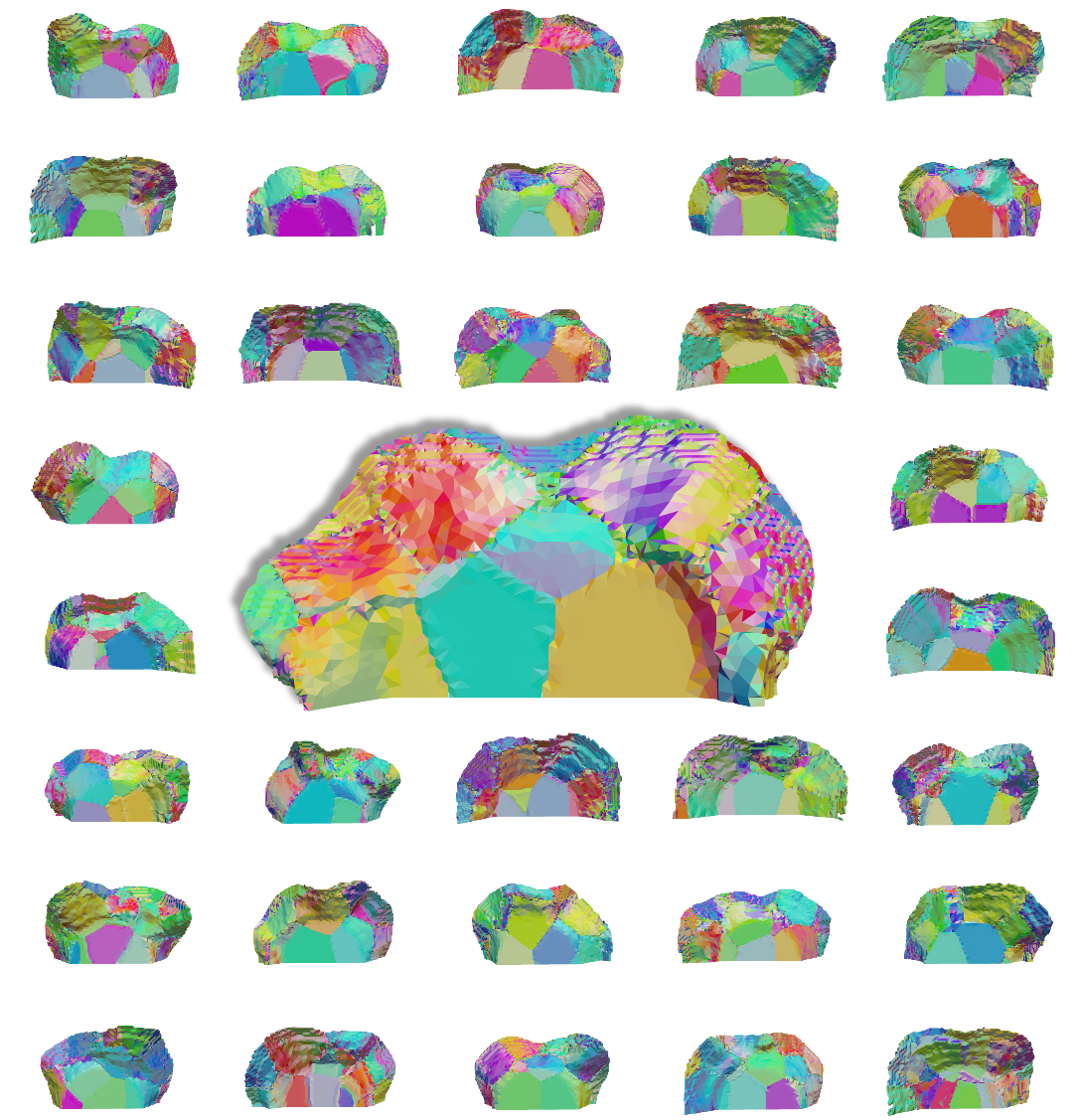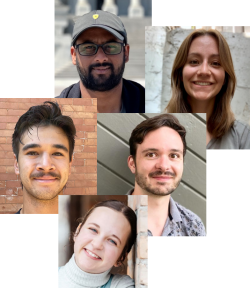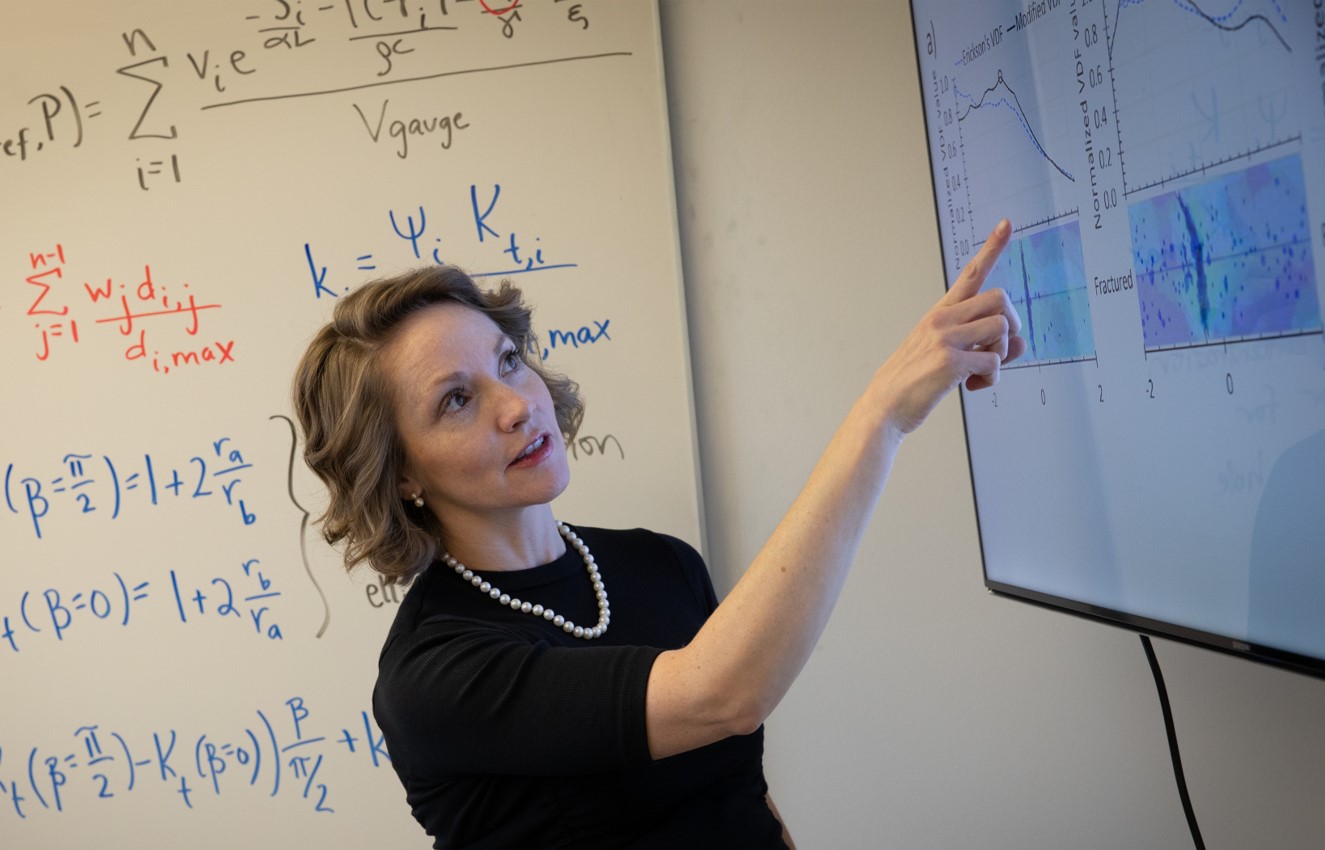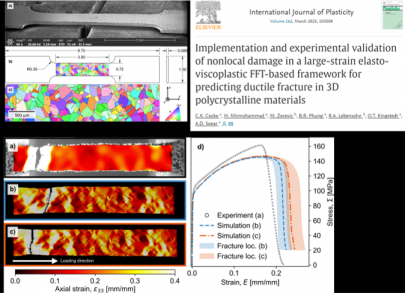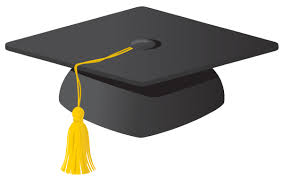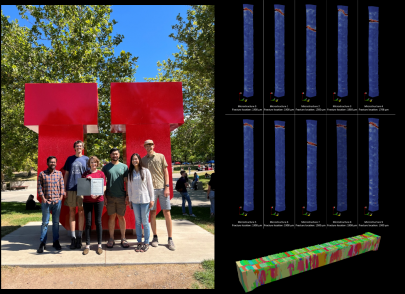Our latest work on an interleaved physics-based deep-learning approach to accelerate high-fidelity predictions of microstructurally small fatigue crack propagation in 3D polycrystals has just been published in npj Computational Materials! We believe the work provides a template for many time-series applications in materials science, beyond fatigue and fracture. Abstract: Conventional fracture mechanics asserts that the relevant physics governing small crack growth occurs near the crack front. However, for fatigue, computing these physics for each crack-growth increment over the entire microstructurally small crack regime is computationally intractable. Properly trained deep-learning surrogate models can massively accelerate fatigue crack-growth predictions by virtually...
Continue readingMMM Lab represents at TMS Specialty Congress
MMM Lab members presented their work at this year’s TMS Specialty Congress held in Anaheim, CA. The lineup of MMM Lab talks included: ************************************************************** Title: A High-Fidelity Fatigue-Life Modeling Framework Using Fast Fourier Transforms Track: 3DMS 2025 Speaker: Nathan Searle Co-authors: Krishna Logakannan, Laura Vietz, Benjamin Anglin (Naval Nuclear Lab), Ashley Spear ************************************************************** Title: An Interleaved Physics-Based Deep-Learning Framework as a New Cycle Jumping Approach for Microstructurally Small Fatigue Crack Growth Simulations Track: AIM 2025 Speaker: Ashley Spear Co-author: Vignesh Babu Rao ************************************************************** Title: Modeling the Hardening and Damage Evolution of Additively Manufactured Metal Matrix Composites Using an Elasto-Viscoplastic...
Continue readingClaire Ticknor wins student presentation competition at ICAM 2024
original story published at https://www.mech.utah.edu/me-student-wins-student-presentation-competition-at-icam/ Department of Mechanical Engineering PhD Student Claire Ticknor recently won a prestigious student presentation competition at the International Conference on Advanced Manufacturing (ICAM) hosted by ASTM in Atlanta. The competition was judged by a select group of Scientific Organizing Committee members on the quality of the presentation and technical content presented. Students from institutions around the world participated. The ICAM conference is the annual flagship conference for ASTM and emphasizes standardization, qualification, and certification around additive manufacturing, with a particular focus on industry-specific requirements. In addition to the specific requirements of various industry sectors,...
Continue reading“Innovative research in simulating 3-D cracking”
Prof. Ashley Spear has received the Constance Tipper Silver Medal from the International Congress on Fracture (ICF), the highest honor that the ICF bestows on a mid-career researcher. The award is given every four years in honor of Constance Tipper, a pioneer in the field of fracture mechanics who is well-known for her discoveries of ductile-to-brittle transition in metals used in the construction of wartime ships during World War II. Spear received the medal in Tipper’s honor for her “innovative research in simulating 3-D cracking and multi-scale modeling of fracture in metals.” One of the cornerstones of Spear’s lab...
Continue readingMMM Lab Represents at TMS Annual Meeting
MMM Lab members recently presented work at the TMS Annual Meeting in San Diego, CA. The following presentations included MMM Lab members: Predicting Microstructurally Sensitive Fatigue-crack Path in WE43 Magnesium Using High-fidelity Numerical Modeling and Three-dimensional Experimental Characterization: Brian Phung, Duncan Greeley (Univ. of Michigan), Mohammadreza Yaghoobi (Univ. of Michigan), John Allison (Univ. of Michigan), Ashley Spear Accelerating Microstructurally Small Crack Growth Predictions in Three-dimensional Microstructures Using Deep Learning: Vignesh Babu Rao, Brian Phung, Bjorn Johnsson, Ashley Spear Predicting Microstructure-sensitive Fracture Behavior in AM IN625 Using a Damage-enabled Elasto-viscoplastic FFT Framework: Ashley Spear, Carter Cocke, Brian Phung, Laura Ziegler,...
Continue readingMMM Lab welcomes five new members
The MMM Lab recently welcomed Dr. Krishna Prasath Logakannan, Claire Ticknor, Jake Hirst, Bjorn Johnsson, and Allie Richards. Dr. Krishna Logakannan joins the lab as a postdoctoral researcher after earning his Ph.D. in 2021 at IIT Madras and the India & Swinburne University of Technology. He later moved to Johns Hopkins University where he was a member of the Hopkins Extreme Materials Institute prior to joining the MMM Lab at Utah. Claire Ticknor joins the lab as a Ph.D. student. She is originally from Los Alamos, New Mexico, and earned her B.S. degree in Mechanical Engineering at the...
Continue readingSpear Named University Presidential Scholar
The annual award recognizes excellence and achievement for faculty members at the assistant or associate professor level and comes with $10,000 in annual funding for three years to support their scholarship and enrich their research activities. Read more in the full article here: https://attheu.utah.edu/facultystaff/2022-u-presidential-scholars-named/ ...
Continue readingDamage-enabled FFT simulations provide insight into failure of 3D polycrystalline materials
The MMM Lab and collaborators from Los Alamos National Laboratory and the High Strain-Rate Mechanics of Materials Lab at Utah published work on their recent implementation and experimental validation of a damage-enabled crystal-plasticity FFT code. Click here to read the full paper in the International Journal of Plasticity!...
Continue readingCongratulations to Dr. Karen DeMille and Carter Cocke!
We are pleased to announce the graduation of MMM Lab members Karen DeMille and Carter Cocke. Karen DeMille successfully defended her Ph.D. dissertation entitled Establishment of Representative Volume Elements for Microstructurally Small Cracks Using Numerical Simulation and Machine Learning. In her dissertation, she explores the question: “What is the minimum volume of microstructure needed to accurately capture the fields around a microstructurally small crack?”. Since graduating, she has been working as a Research Mechanical Engineer at the Air Force Research Laboratory (AFRL). Congratulations, Dr. DeMille! Carter Cocke successfully defended his M.S....
Continue readingMMM Lab Awarded 1st Place NIST AM-Bench Challenge
The MMM Lab received a first-place award in the National Institute for Standards and Technology (NIST) Additive Manufacturing Benchmark Test Series, a competition that enables teams to test their simulations against additive manufacturing benchmark test data. The team included graduate students Carter Cocke, Brian Phung, Laura Ziegler, Elliott Marsden, and Vignesh Babu Rao. In the team’s specific challenge, titled “Subcontinuum Mesoscale Tensile Test,” all the competing teams were given a set of materials characterization data for a small sample of 3D-printed Inconel 625, a type of nickel alloy. They were then asked to make blind predictions of the mechanical (stress-strain)...
Continue reading



